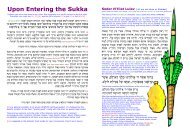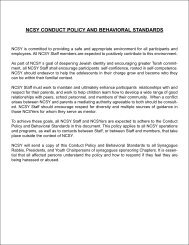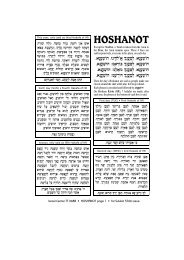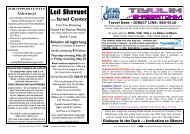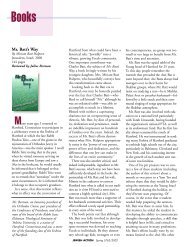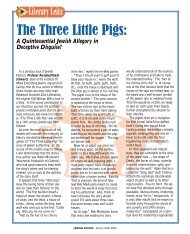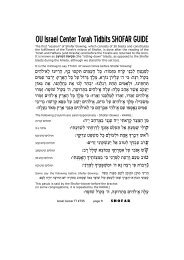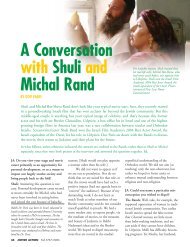Create successful ePaper yourself
Turn your PDF publications into a flip-book with our unique Google optimized e-Paper software.
didn't even go in one ear. Now that I hear that it goes in one ear<br />
and out the other, I am sure that at least something will<br />
remain."<br />
Shmuel Himelstein has written a wonderful series for<br />
ArtScroll: Words of Wisdom, Words of Wit; A Touch of<br />
Wisdom, A Touch of Wit; and" Wisdom and Wit" — available<br />
at your local Jewish bookstore (or should be). Excerpted with<br />
the permission of the copyright holder<br />
renders us a service at the commonly accepted time is a<br />
mitzva. It is something we do anyway, but it is no less a mitzva.<br />
Therefore, one should have KAVANA to fulfill this mitzva<br />
when we pay for services.<br />
(Not a TTriddle) (but it could have been) There are 48 KIs in<br />
KI TEITZEI (plus 2 V'CHIs). [67 LOs (LAMEDALEF)]<br />
[3] Candle by Day<br />
We confuse obstacles for barriers.<br />
from A Candle by Day by Rabbi Shraga Silverstein<br />
[4] Micro Ulpan a word (or two) from HaAcademiya<br />
LaLashon HaIvrit<br />
This one's different because it is a known word, but according<br />
to HaAcademiya, we have it a little wrong. (No criticism<br />
intended.) Babysitter is NOT "BEIBISITER" but not<br />
SH'MARTAF either. That's close. SHOMER TAF. Two words.<br />
Female: ;SHOMERET TAF. Plural: ;SHOMREI TAF, Baby<br />
sitting? SHMIRAT TAF<br />
[5] CHIZUK and IDUD (for Olim & notyetOlim respectively)<br />
When speaking about Aliya, Diaspora Jews sometimes say,<br />
“Certainly we are planning to live in Israel. But with all the<br />
fighting there, we can’t go now. We will go as soon as the<br />
situation becomes more peaceful.”<br />
The message of this week’s Torah portion is different. The<br />
opening verse, “When you go forth to war against your<br />
enemies,”teaches that war is an integral part of our Divine<br />
national mission. Seven out of the 613 mitzvot of the Torah<br />
deal with war. God Himself is called “The Master of War.”<br />
Ramban explains that the commandment to wage war,<br />
milchemet mitzva, is part of the mitzva of dwelling in the Land<br />
of Israel and keeping it under Jewish sovereignty. Establishing<br />
nation al Jewish life in Eretz Yisrael is the way that we<br />
perform this mitzva, to be actively pursued by the Jewish<br />
People at all times. We do this with the IDF and with the Aliya<br />
of every Jew to the Land of Israel. Not only with tanks and<br />
airplanes, but with every new Jewish house, stroller, and<br />
washing machine.<br />
The Torah’s commandments dealing with war teach us that<br />
even when enemy nations dispute our right to the Land, we<br />
must call up our inner fortitude and courage, and summon our<br />
readiness to sacrifice for the sake of our Land, our nation, and<br />
our God. We must take active steps to enter the Land of Israel,<br />
dwell in it, and establish God’s Kingdom on earth, even at the<br />
price of personal hardship and war. The precept of defending<br />
the Jewish nation in the Land of Israel and developing Jewish<br />
settlement in all of its borders is the Divine command which<br />
beckons to all of world Jewry today, just as it did in the time of<br />
Joshua. As the Haftara says, “And your seed shall possess<br />
nations, and make desolate cities to be inhabited. Don’t be<br />
afraid.”<br />
[6] Various Divrei Torah<br />
Rabbi David Samson, Jerusalem<br />
Paying a barber, hairdresser, tax driver and anyone who<br />
U'VI'ARTA HARA MIKIRBECHA<br />
The phrase appears 7 times in the Torah, all in D'varim,<br />
including 4 times in Ki Teitzei. Various commentaries point<br />
out the singular form of the phrase: And YOU (singular) shall<br />
burn out the evil inside you (singluar). Whatever the sin that<br />
others are committing, each one of us first has to take care of<br />
the evil within each one of us...<br />
ZACHOR<br />
Follow this (it's a little confusing):<br />
The Torah commands us (in the last p'sukim of Ki Teitzei,<br />
which is why you are reading this now) to remember what<br />
Amalek did to us on our way out of Egypt. It is generally<br />
agreed that "remembering" is to be done yearly, because a<br />
year's time is the measure traditionally given for remembering<br />
vs. forgetting. The reading Zachor yearly was fixed on the<br />
Shabbat before Purim, by rabbinic decree, to highlight the fact<br />
that Haman was an Amaleki. However, from the Torah's<br />
perspective alone, there is no fixed time.<br />
Now, the time of "forgetting", as mentioned above, is not<br />
referred to in the Gemara as a year, but rather as 12 months. If<br />
one considers this to be synonymous with a year, then there is<br />
no problem with the yearly observance of Shabbat Parshat<br />
Zachor. But if 12 months is to be taken literally as some<br />
halachic authorities of the past did then we have an interesting<br />
situation coming up.<br />
5765 is a 13month year, with two Adars. Zachor will be read<br />
in the second Adar, which will be more than 12 months since<br />
the last time it was read. According to some opinions, that<br />
constitutes an improper nonfulfillment of the mitzva of<br />
Zachor.<br />
The solution is to request of the Torah reader this Shabbat, that<br />
when he reads the final three p'sukim of Ki Teitzei (which is<br />
actually done twice), he should have in mind the mitzva of<br />
Zachor (IF it needs to be fulfilled now). And we listening,<br />
should also have in mind to fulfill this mitzva.<br />
Not everyone agrees that this is necessary, but it is a way to<br />
finetune our mitzvaobservance.<br />
[7] MA RABU MAASECHA HASHEM...<br />
MOONRAT<br />
The appropriateness of this week's choice of animals is based<br />
on at least two mitzvot (prohibitions) in this week's sedra: One<br />
may not muzzle a moonrat (or any animal) while it is working<br />
with food, and one may not harness a moonrat (or any animal)<br />
with an ox (or any other animal) to pull a plow (or for any other<br />
purpose).<br />
The moonrat (not a rat or even a rodent) is the largest living<br />
insectivore (one of 20 or more orders of mammals order being<br />
a major subdivision of class and a major grouping of families<br />
Israel Center TT #633 (.pdf version) · page 9 · Shabbat Parshat KI TEITZEI




